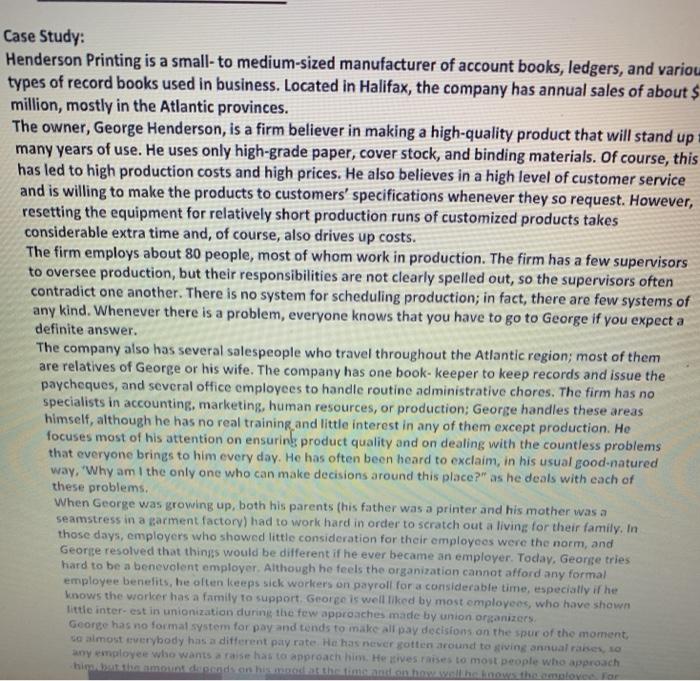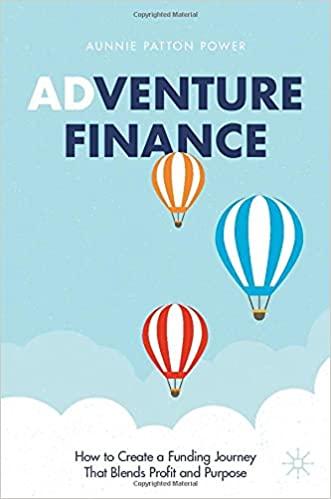Case Study: Henderson Printing is a small-to medium-sized manufacturer of account books, ledgers, and variou types of record books used in business. Located in Halifax, the company has annual sales of about $ million, mostly in the Atlantic provinces. The owner, George Henderson, is a firm believer in making a high-quality product that will stand up many years of use. He uses only high-grade paper, cover stock, and binding materials. Of course, this has led to high production costs and high prices. He also believes in a high level of customer service and is willing to make the products to customers' specifications whenever they so request. However, resetting the equipment for relatively short production runs of customized products takes considerable extra time and, of course, also drives up costs. The firm employs about 80 people, most of whom work in production. The firm has a few supervisors to oversee production, but their responsibilities are not clearly spelled out, so the supervisors often contradict one another. There is no system for scheduling production; in fact, there are few systems of any kind. Whenever there is a problem, everyone knows that you have to go to George if you expect a definite answer. The company also has several salespeople who travel throughout the Atlantic region; most of them are relatives of George or his wife. The company has one book-keeper to keep records and issue the paycheques, and several office employees to handle routine administrative chores. The firm has no specialists in accounting, marketing, human resources, or production: George handles these areas himself, although he has no real training and little interest in any of them except production. He focuses most of his attention on ensuring product quality and on dealing with the countless problems that everyone brings to him every day. He has often been heard to exclaim, in his usual good-natured way, "Why am I the only one who can make decisions around this place?" as he deals with each of these problems. When George was growing up, both his parents (his father was a printer and his mother was a seamstress in a garment factory) had to work hard in order to scratch out a living for their family. In those days, employers who showed little consideration for their employees were the norm, and George resolved that things would be different if he ever became an employer. Today, George tries hard to be a benevolent employer. Although he feels the organization cannot afford any formal employee benefits, he often keeps sick workers on payroll for a considerable time, especially if he knows the worker has a family to support George is well liked by most employees, who have shown little interest in unionization during the few approaches made by union organizers George has no formal system for pay and tends to make all pay decisions on the spur of the moment, co almost everybody has a different pay rate. He has never gotten around to giving annual raises to any employee who wants a rais has to approach him. He lives raises to most people who approach hithmon ends on his death the linows the male or Case Study: Henderson Printing is a small-to medium-sized manufacturer of account books, ledgers, and variou types of record books used in business. Located in Halifax, the company has annual sales of about $ million, mostly in the Atlantic provinces. The owner, George Henderson, is a firm believer in making a high-quality product that will stand up many years of use. He uses only high-grade paper, cover stock, and binding materials. Of course, this has led to high production costs and high prices. He also believes in a high level of customer service and is willing to make the products to customers' specifications whenever they so request. However, resetting the equipment for relatively short production runs of customized products takes considerable extra time and, of course, also drives up costs. The firm employs about 80 people, most of whom work in production. The firm has a few supervisors to oversee production, but their responsibilities are not clearly spelled out, so the supervisors often contradict one another. There is no system for scheduling production; in fact, there are few systems of any kind. Whenever there is a problem, everyone knows that you have to go to George if you expect a definite answer. The company also has several salespeople who travel throughout the Atlantic region; most of them are relatives of George or his wife. The company has one book-keeper to keep records and issue the paycheques, and several office employees to handle routine administrative chores. The firm has no specialists in accounting, marketing, human resources, or production: George handles these areas himself, although he has no real training and little interest in any of them except production. He focuses most of his attention on ensuring product quality and on dealing with the countless problems that everyone brings to him every day. He has often been heard to exclaim, in his usual good-natured way, "Why am I the only one who can make decisions around this place?" as he deals with each of these problems. When George was growing up, both his parents (his father was a printer and his mother was a seamstress in a garment factory) had to work hard in order to scratch out a living for their family. In those days, employers who showed little consideration for their employees were the norm, and George resolved that things would be different if he ever became an employer. Today, George tries hard to be a benevolent employer. Although he feels the organization cannot afford any formal employee benefits, he often keeps sick workers on payroll for a considerable time, especially if he knows the worker has a family to support George is well liked by most employees, who have shown little interest in unionization during the few approaches made by union organizers George has no formal system for pay and tends to make all pay decisions on the spur of the moment, co almost everybody has a different pay rate. He has never gotten around to giving annual raises to any employee who wants a rais has to approach him. He lives raises to most people who approach hithmon ends on his death the linows the male or







